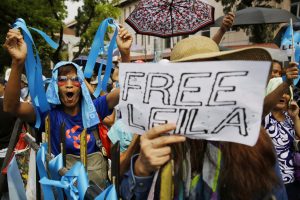A year ago, I wrote an article marking the fourth year in detention of the Philippine Senator Leila de Lima, a fierce critic of President Rodrigo Duterte and his administration. Unfortunately, little has changed in the year since: tomorrow, de Lima will mark her fifth year in prison on transparently political charges.
In February 2017, prosecutors filed criminal charges against de Lima, alleging her involvement in the trafficking of narcotics within the country’s prison system during the 2010-16 administration of Benigno Aquino, when she was justice secretary. A week later, on February 24, she surrendered herself to the police.
The claim that the arrest was politically motivated is hard to dispute. Prior to her arrest, de Lima served as chair of the Senate Committee on Justice and Human Rights, in which capacity she had begun a public inquiry into Duterte’s “war on drugs,” a blood-soaked extrajudicial campaign that has since claimed thousands of lives.
In her testimony to the Senate in August 2016, she lamented the “dehumanization” that the drug war had wrought. “Impunity, once unleashed, has no boundaries,” said De Lima. “Drugs destroy lives, but we need not destroy lives to destroy drugs.”
Before Duterte’s election in 2016, she also chaired the government’s Commission on Human Rights and spearheaded investigations of summary executions carried out by “death squads” in the southern Philippine city of Davao City, where Duterte was mayor for more than two decades.
While turning herself in to police, de Lima told reporters, “It is my honor to be imprisoned for the things I am fighting for. They will not be able to silence me and stop me from fighting for the truth and justice and against the daily killings and repression by the Duterte regime.”
Despite being acquitted of one of the charges against her in February of last year, de Lima still faces two charges the proceedings of which have faced significant delays.
In detention at the police headquarters at Camp Crame, she has continued to perform her legislative duties – in the first two years of her imprisonment, she managed to file 142 bills and 146 resolutions – but the authorities have not made it easy for her. According to the advocacy group Human Rights Watch (HRW), de Lima “has been held incommunicado for long periods, not allowed to use electronic devices, faced severe restrictions on visits, and has often been prevented by police escorts from talking to reporters on her way to court hearings.”
All the while, Duterte’s allies have reveled in her predicament. In February 2018, on the anniversary of her imprisonment, presidential spokesperson (and former human rights lawyer) Harry Roque sarcastically wished de Lima a “happy anniversary” and described her as “a living symbol that the Philippines has become a narco-state with her election in office funded by drugs.”
HRW’s Asia Director Brad Adams said in a statement yesterday that de Lima’s long-term wrongful detention “exemplifies the lawlessness and cruelty of the Duterte administration.”
Given the clear vendetta that Duterte has against De Lima, there is a chance that end of his term in June will open the way for her acquittal. Adams said that candidates running in May’s presidential elections “should commit to free de Lima immediately and to rebuild the Philippines’ tarnished criminal justice system to meet international standards.” But he added, “She should not have to wait for the election of the country’s next president to be released.”

































